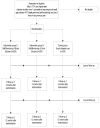Effects of self-monitoring of glucose in non-insulin treated patients with type 2 diabetes: design of the IN CONTROL-trial
- PMID: 19397795
- PMCID: PMC2679708
- DOI: 10.1186/1471-2296-10-26
Effects of self-monitoring of glucose in non-insulin treated patients with type 2 diabetes: design of the IN CONTROL-trial
Abstract
Background: Diabetes specific emotional problems interfere with the demanding daily management of living with type 2 diabetes mellitus (T2DM). Possibly, offering direct feedback on diabetes management may diminish the presence of diabetes specific emotional problems and might enhance the patients' belief they are able to manage their illness. It is hypothesized that self-monitoring of glucose in combination with an algorithm how and when to act will motivate T2DM patients to become more active participants in their own care leading to a decrease in diabetes related distress and an increased self-efficacy.
Methods and design: Six hundred patients with T2DM (45 < or = 75 years) who receive care in a structured diabetes care system, HbA1c > or = 7.0%, and not using insulin will be recruited and randomized into 3 groups; Self-monitoring of Blood Glucose (SMBG), Self-monitoring of Urine Glucose (SMUG) and usual care (n = 200 per group). Participants are eligible if they have a known disease duration of over 1 year and have used SMBG or SMUG less than 3 times in the previous year. All 3 groups will receive standardized diabetes care. The intervention groups will receive additional instructions on how to perform self-monitoring of glucose and how to interpret the results. Main outcome measures are changes in diabetes specific emotional distress and self-efficacy. Secondary outcome measures include difference in HbA1c, patient satisfaction, occurrence of hypoglycaemia, physical activity, costs of direct and indirect healthcare and changes in illness beliefs.
Discussion: The IN CONTROL-trial is designed to explore whether feedback from self-monitoring of glucose in T2DM patients who do not require insulin can affect diabetes specific emotional distress and increase self-efficacy. Based on the self-regulation model it is hypothesized that glucose self-monitoring feedback changes illness perceptions, guiding the patient to reduce emotional responses to experienced threats, and influences the patients ability to perform and maintain self-management skills.
Similar articles
-
Effects of self-monitoring of glucose on distress and self-efficacy in people with non-insulin-treated Type 2 diabetes: a randomized controlled trial.Diabet Med. 2016 Apr;33(4):537-46. doi: 10.1111/dme.12849. Epub 2015 Aug 18. Diabet Med. 2016. PMID: 26171942 Clinical Trial.
-
Blood glucose self-monitoring in type 2 diabetes: a randomised controlled trial.Health Technol Assess. 2009 Feb;13(15):iii-iv, ix-xi, 1-50. doi: 10.3310/hta13150. Health Technol Assess. 2009. PMID: 19254484 Clinical Trial.
-
Is the frequency of self-monitoring of blood glucose related to long-term metabolic control? Multicenter analysis including 24,500 patients from 191 centers in Germany and Austria.Exp Clin Endocrinol Diabetes. 2006 Jul;114(7):384-8. doi: 10.1055/s-2006-924152. Exp Clin Endocrinol Diabetes. 2006. PMID: 16915542
-
Systematic Review of Randomized Controlled Trials Evaluating Glycemic Efficacy and Patient Satisfaction of Intermittent-Scanned Continuous Glucose Monitoring in Patients with Diabetes.Diabetes Technol Ther. 2020 May;22(5):337-345. doi: 10.1089/dia.2019.0345. Diabetes Technol Ther. 2020. PMID: 31859531
-
Evaluating the impact of self-monitoring of blood glucose frequencies on glucose control in patients with type 2 diabetes who do not use insulin: A systematic review and meta-analysis.Int J Clin Pract. 2019 Jul;73(7):e13357. doi: 10.1111/ijcp.13357. Epub 2019 May 22. Int J Clin Pract. 2019. PMID: 31033116
Cited by
-
Is it possible to predict improved diabetes outcomes following diabetes self-management education: a mixed-methods longitudinal design.BMJ Open. 2015 Nov 2;5(11):e008781. doi: 10.1136/bmjopen-2015-008781. BMJ Open. 2015. PMID: 26525722 Free PMC article.
-
Assessing the relationship between computational speed and precision: a case study comparing an interpreted versus compiled programming language using a stochastic simulation model in diabetes care.Pharmacoeconomics. 2010;28(8):665-74. doi: 10.2165/11535350-000000000-00000. Pharmacoeconomics. 2010. PMID: 20524723
-
Self-monitoring of blood glucose in noninsulin-treated type 2 diabetes: an overview.Diabetes Metab Syndr Obes. 2009 Sep 9;2:155-63. Diabetes Metab Syndr Obes. 2009. PMID: 21437129 Free PMC article.
-
The effectiveness of case management for comorbid diabetes type 2 patients; the CasCo study. Design of a randomized controlled trial.BMC Fam Pract. 2011 Jul 5;12:68. doi: 10.1186/1471-2296-12-68. BMC Fam Pract. 2011. PMID: 21729265 Free PMC article. Clinical Trial.
-
Self-monitoring of blood glucose in patients with type 2 diabetes mellitus who are not using insulin.Cochrane Database Syst Rev. 2012 Jan 18;1(1):CD005060. doi: 10.1002/14651858.CD005060.pub3. Cochrane Database Syst Rev. 2012. PMID: 22258959 Free PMC article.
References
Publication types
MeSH terms
Substances
Associated data
LinkOut - more resources
Full Text Sources
Medical


